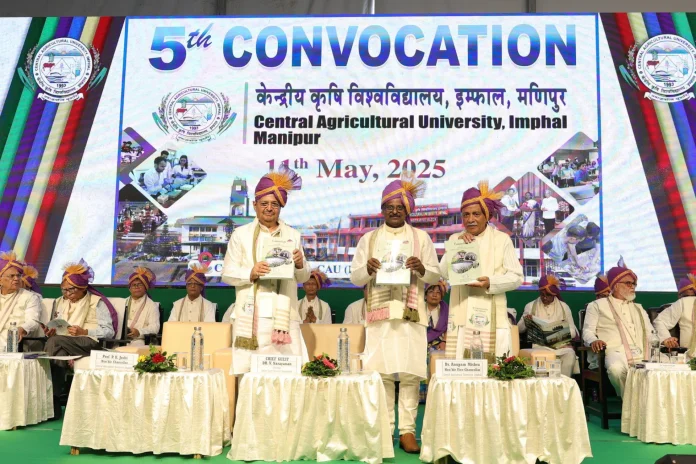IMPHAL, May 12: Indian Space Research Organisation (ISRO) Chairman V Narayanan on Sunday said that at least 10 satellites are working round-the-clock to safeguard the nation, especially amid heightened tensions with Pakistan following Operation Sindoor. He made the remarks while addressing the 5th Convocation of the Central Agricultural University (CAU) in Imphal, Manipur.
The ISRO Chairman stated, “If we want to ensure the safety of our country, we have to serve through our satellites. We have to monitor our 7,000 km seashore areas. Without satellite and drone technology, we can’t achieve many things.”
He highlighted that through many satellites, ISRO has been serving common citizens in various sectors such as agriculture, tele-education, tele-medicine, television broadcast, weather forecasting, environment, food, and security and strategic areas.
Narayanan also pointed out that satellites are effectively working in disaster management and mitigation sectors, noting that while thousands of people used to lose their lives during disasters in the past, that is no longer the case today.
He claimed that in nine space sector areas, India is number one in the world, adding: “Chandrayaan-1 mission discovered evidence of water molecules on the Moon’s surface. India was the first country to achieve this. At least 433 satellites for 34 countries have been lifted from India and placed in orbit.”
Significantly, he said that India has built satellites for G-20 countries to monitor climate change and other sectors. He also revealed that India and the United States would jointly build the world’s most expensive and advanced earth-imaging satellite, which would be launched from India.
Reflecting on the country’s progress, Narayanan noted that until 1975, India had no satellite technology and was 70 years behind compared to advanced countries. He said advanced satellite technologies are vital for the development of the common man, and predicted that before India celebrates 100 years of independence, the country would become a master in every field and an outstanding contributor to the world.
Speaking on India’s broader growth, Narayanan said that in the 1950s and 1960s, the country produced 54 million tons of food and imported food from abroad. “Now India produces 250 million tons plus and exports food to many countries. The country has a huge consumer market and a large manufacturing sector. In electricity generation and milk production, we are in a leading position globally.”
He further said that India now ranks among the top five globally in the production of several key commodities including rice, wheat, maize, horticultural crops, pulses, oil seeds, and cash crops.
“With development in all sectors, average life expectancy increased from 32 years to 72 years in the last few decades. Child and mother mortality rates have also declined sharply,” he pointed out.
Narayanan announced that around 100 science students from each of the eight North-Eastern states would be given the opportunity to visit the ISRO centre in Bengaluru to ignite curiosity and foster awareness about space science and technology.
He also emphasized that ISRO and its satellites are operational for the development of North-Eastern states, facilitating the execution of various projects in the region.
The ISRO Chairman urged students to contribute to society after obtaining their degrees. “There is no substitute for hard work and smart work. Total commitment and the pivotal quality of a person are essential. Self-confidence and self-motivation are crucial. With noble leadership qualities, students must become good human beings,” Narayanan stated.

